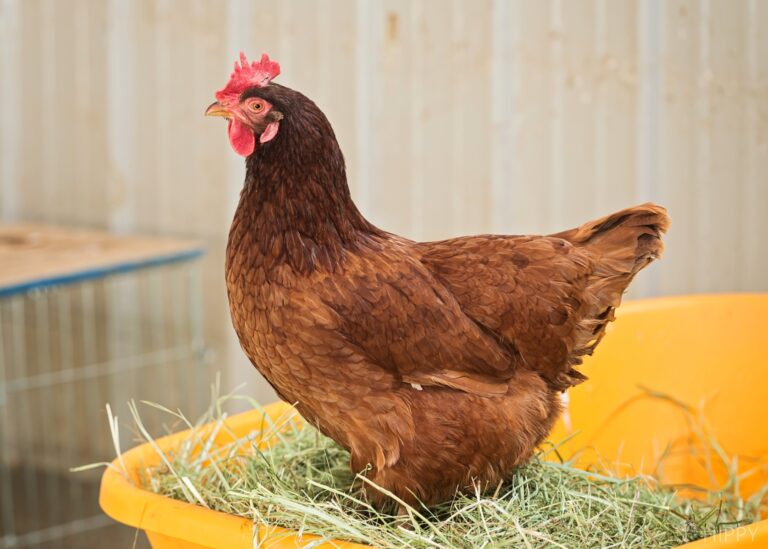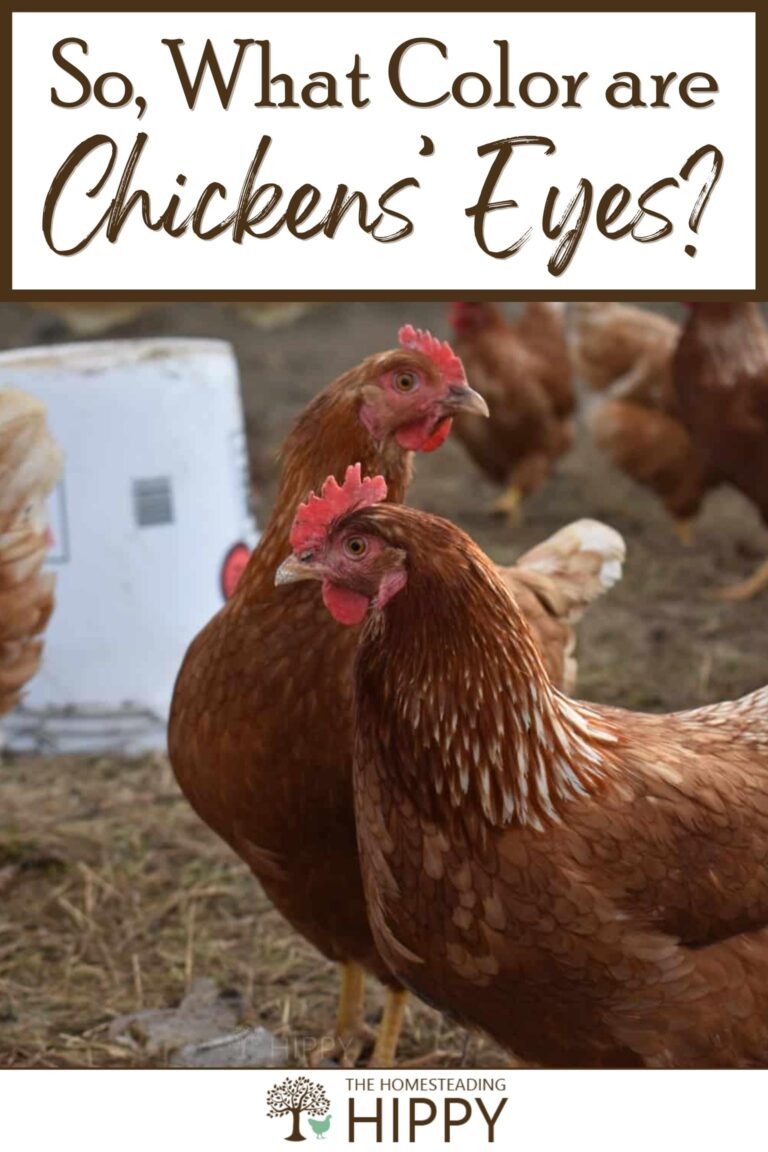Chickens are one of those birds that don’t get enough attention for their sheer beauty because of their ubiquity. Just a common chicken, right?

But they can look so marvelous, especially a majestic rooster with his full and iridescent plumage. What a sight! And part of what makes chickens so beautiful are those shining and inquisitive eyes they have.
But now that I think about it, it is tough to nail down just what color chickens’ eyes really are. Just what color are a chicken’s eyes?
Healthy chickens have various eye colors: crimson or rust red, orange, amber, yellow, or gold. Albino chickens have pale pink or red eyes. Gray, green or blue eyes might indicate health problems.
It turns out there is a lot going on with a chicken’s eyes that you need to know if you want to stay aware of their condition and overall health.
A chicken’s eyes changing color might be the first warning you have that something is amiss. Keep reading to learn everything you need to know about a chicken’s eyes.
Common Chicken Eye Colors
Adult, healthy chickens usually have eyes that are one of several colors. Among the most common are red, orange, amber, yellow, and gold. Eye color is determined by genetics, breed, and health.
From the typical bright red of a Rhode Island Red to the usual deep amber of a Buff Orpington, chicken eye colors are as varied as the birds themselves.
But what really determines a chicken’s eye color? The answer, it turns out, is not as simple as you might think.
In chickens, as in other animals, eye color is determined by the presence or absence of pigment cells in the iris.
The most common pigment cells are melanin, which gives eyes a dark hue, and xanthophyll, which gives eyes a yellow or orange tint.
Interestingly, the color of a chicken’s earlobes might provide clues about its eye color as there is some evidence of correlation.
So the next time you’re admiring your feathered friend’s striking gaze, you’ll know what really gives your chicken’s peepers their lovely look.
However, while most healthy chickens will have one of these eye colors mentioned above, there are some exceptions you should be aware of, as well as what they mean. We’ll talk more about these deviating colors below.
Chicks Have Black Eyes
All baby chicks that are healthy have eyes that a deep, glossy black. This is regardless of the breed or what color their eyes will eventually be as adults.
A chick’s black eyes develop when they are about 10 days old, and their final adult color begins to show around 4-5 weeks of age.
So, if you’re wondering what color your chicken’s eyes will be, take a look at its parents or other chickens of the same breed for some clues.
Albino Chickens Have Pale Pink Eyes
Albino chickens, while not nearly as common as those with healthy eye colors or even as other animals with albinism, do indeed exist.
Albinism in chickens is caused by a genetic mutation that prevents the production of pigment cells in the iris.
This results in pink or red eyes because there is no melanin to give them color and the blood vessels in the eye are visible. They also have ivory or white beaks, too.
Unfortunately, however, these starkly beautiful birds often have health problems that their non-albino counterparts don’t and almost never survive to adulthood in the wild.
Don’t Some Chickens Have Blue Eyes?
If there is one eye color that is sure to start a fight in chicken keeper circles it is the subject of blue eyes. You see, technically speaking, chickens cannot have blue eyes.
Chickens truly do not have blue eyes, no matter how much you might want them to. What people are probably seeing when you think you’ve spotted a chicken with blue eyes is actually a grayish tone, maybe even closer to a sea green or lavender.
Indeed, sometimes their eyes do appear blue, or at least close enough that we’ll let it slide.
However, a chicken with blue eyes might just have a serious health problem, or some other defect. We’ll talk more about that in a minute.
An Adult Chicken’s Eyes Might Change Color for Numerous Reasons
If you own chickens, have you ever caught yourself in that weird, déjà vu-like feeling when you lock eyes with our favorite chicken? Like something is not quite right, something is out of place?
Well, it turns out there is likely a reason for that. In what is sure to be a major surprise to many chicken keepers, a chicken’s eyes might actually change color as adults.
Now, before you start thinking your bird has some kind of rare condition, know that this is actually pretty normal and not something you should be too worried about most of the time. Red eyes might go more orange or even distinctively yellow.
In fact, there are a few different reasons why your chicken’s eyes might change shades as they age.
So, if you’ve noticed that your adult chicken’s eyes don’t look quite the same as when it was a chick, here are a few things that could be causing it…
A Laying Hen’s Eyes Might Dim or Change Color Entirely
The first, most common and usually most pronounced cause of eye-color change in adult chickens is found among laying hens, particularly young hens in their prime.
The female reproductive system of a chicken is nothing short of incredible and amazing. It is also quite large and extends far beyond just the ovaries.
In order to produce all of those eggs, a hen’s body will actually go through some pretty significant changes, mostly in her abdomen.
As a result, changes in biochemistry, stress, and other factors might result in your hen’s eyes appearing to change color.
This is usually first noticed when a hen starts laying eggs and might cause the color of her eyes to dim or intensify.
There are also other causes of color change in the eyes which we will talk about below, and none of these are good, or benign.
Eye Color Could Indicate Marek’s Disease, Lymphomatosis or Other Issues
While a change in eye color might not be anything to worry about in adult chickens, there are other times when it definitely is something you need to take notice of.
For example, if you notice that your chicken’s eyes are turning very pale, gray, bluish or the pupils otherwise look abnormally large or small, this could be an early sign of Marek’s disease.
This is a very serious viral disease that can affect all kinds of poultry and is almost always fatal. In late stages, it can cause blindness.
Other common signs of Marek’s disease include paralysis in the legs, wings, or neck as well as tumors on the body.
If you notice any of these signs in your chicken, it is important to isolate them from the rest of your flock and see a veterinarian as soon as possible. Vaccination can reduce, but not eliminate, the symptoms of this virus.
The other major disease that causes a change in eye color is lymphomatosis, which is cancer of the lymph nodes.
This disease can also affect many different parts of the body and cause a chicken to appear lethargic, have ruffled feathers or stop eating.
Once again, gray eyes are a common marker. If you notice any of these signs in your chicken, don’t wait; call the vet.
Lastly, physical injury to the eye or blindness resulting from some other cause may result in a distinct change of eye color or opacity, which can appear as a change of color shade or tint.
Eye Color Alone is Not Enough Evidence for a Diagnosis- Call Your Vet!
It should be noted that for ages keepers of chickens have been urged by scientists to immediately cull any adult bird showing blue or gray “fish” eyes as they are a nearly certain marker of either of the above, serious conditions.
However, more recent studies have shown that while blue or gray eyes are often a cause for concern, they are not necessarily an indication of either of the two diseases.
In other words, don’t automatically assume your chicken has Marek’s or lymphomatosis just because its eyes have changed color and it is showing some other signs.
The only way to be sure is to take your chicken to the vet for a diagnosis.
Blood tests and other diagnostic tools will be needed to give you a definitive answer, but you will have a proper answer, and maybe spare the life of a bird with an unusual eye color!

Tom has built and remodeled homes, generated his own electricity, grown his own food and more, all in quest of remaining as independent of society as possible. Now he shares his experiences and hard-earned lessons with readers around the country.
Find out more about the team here.
